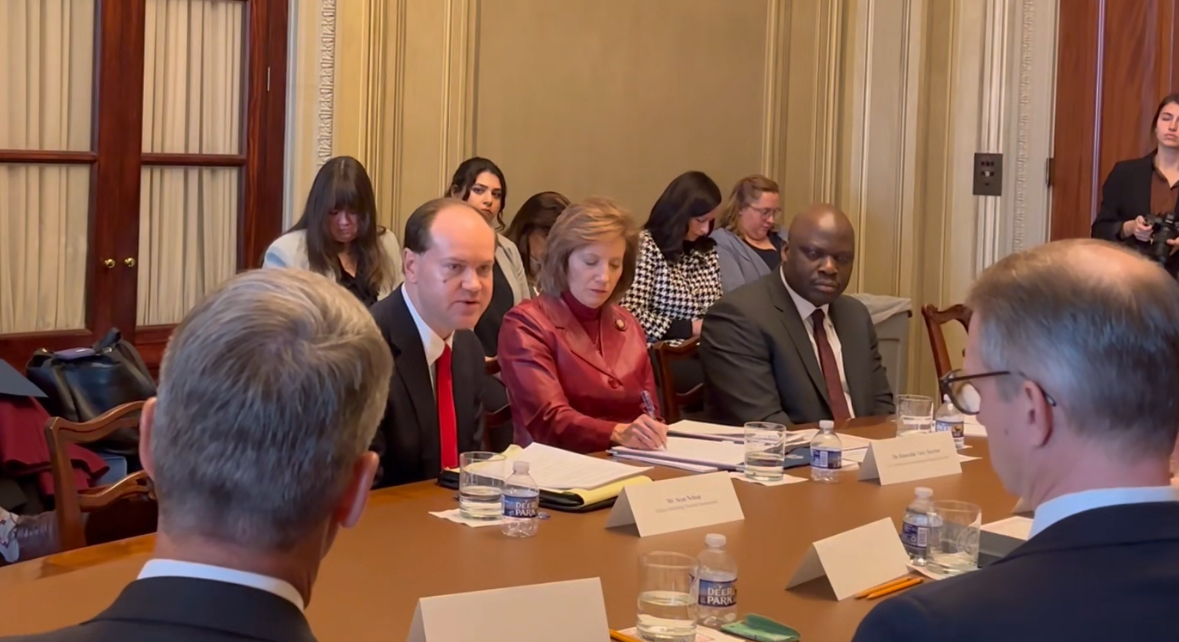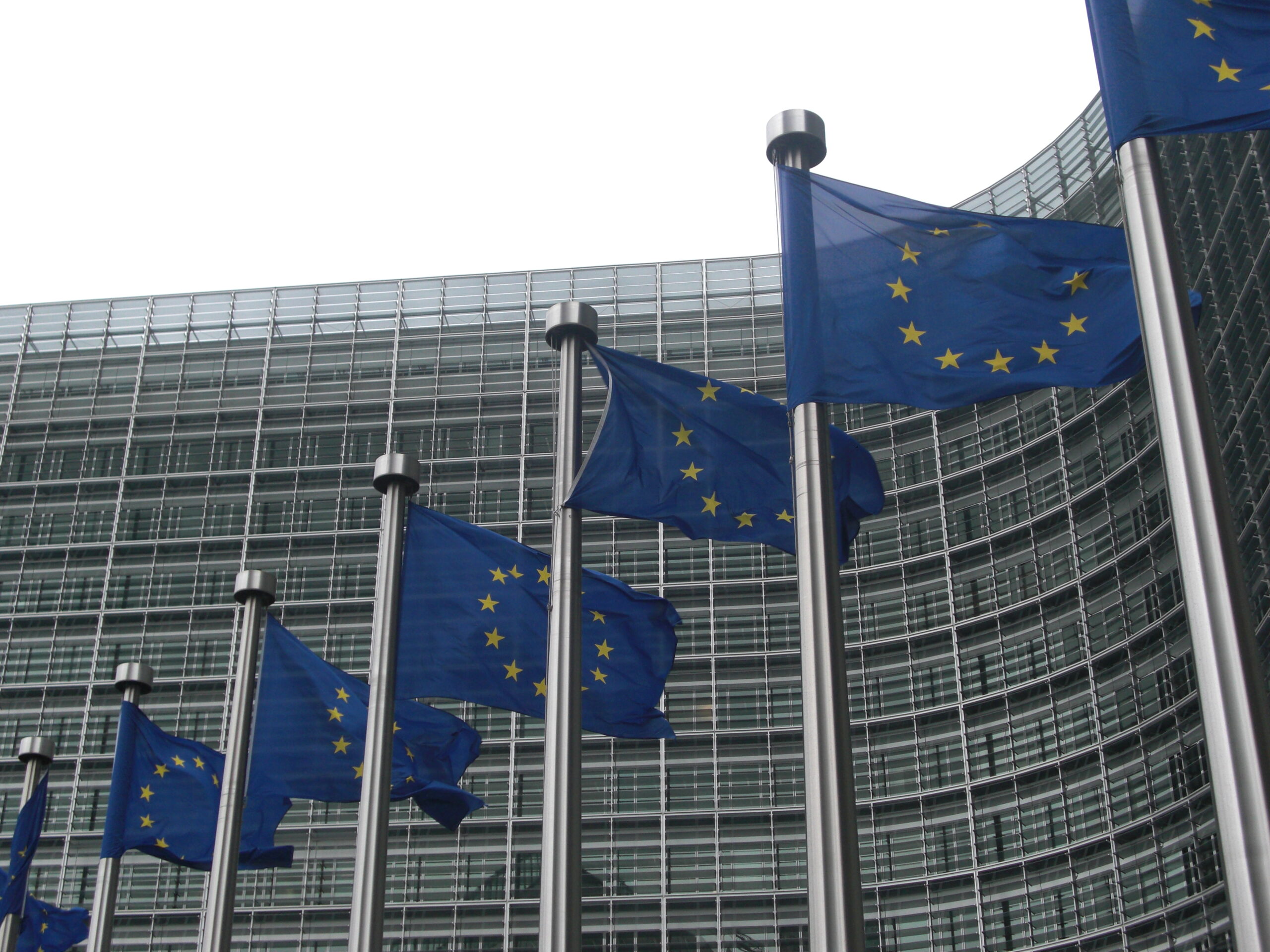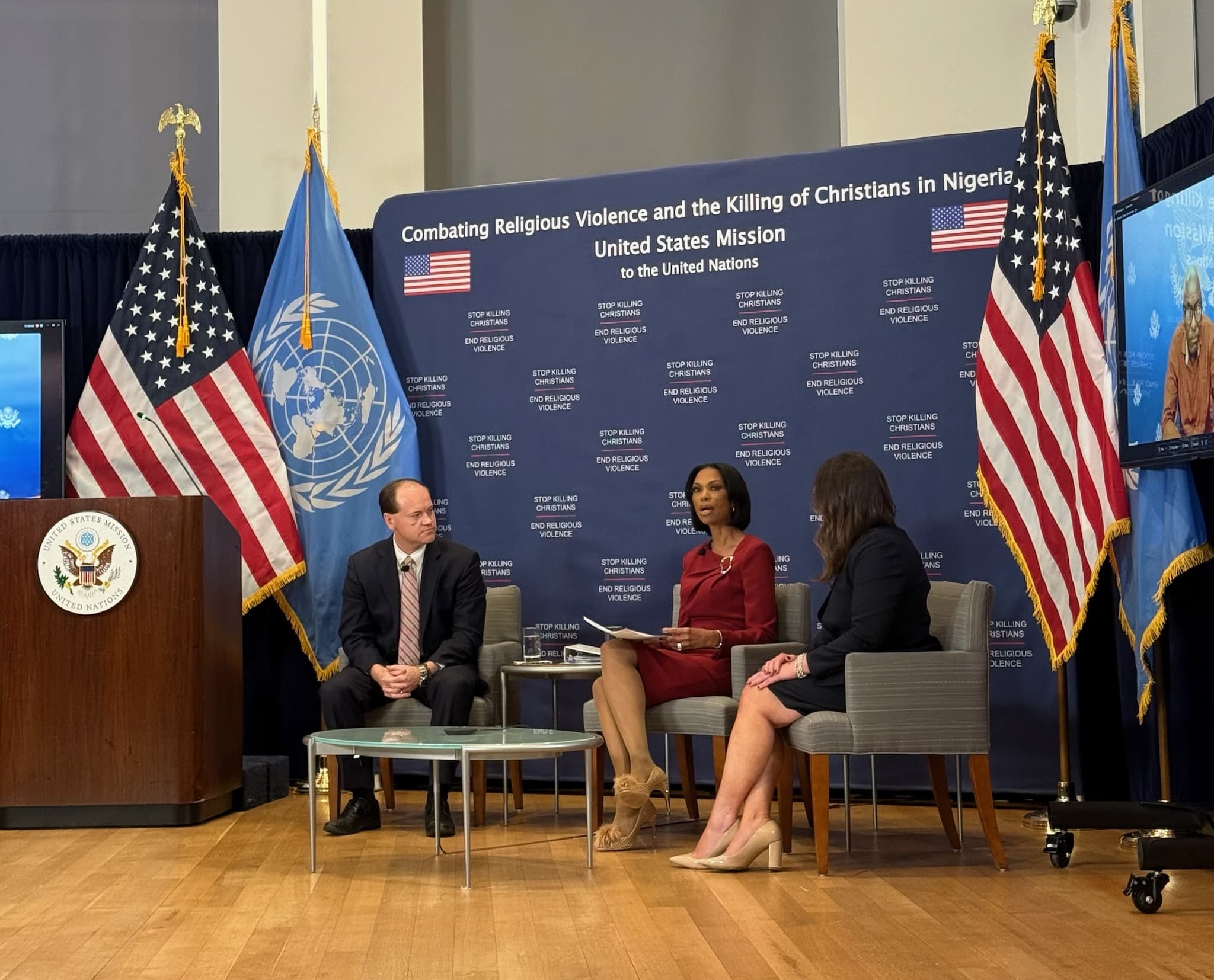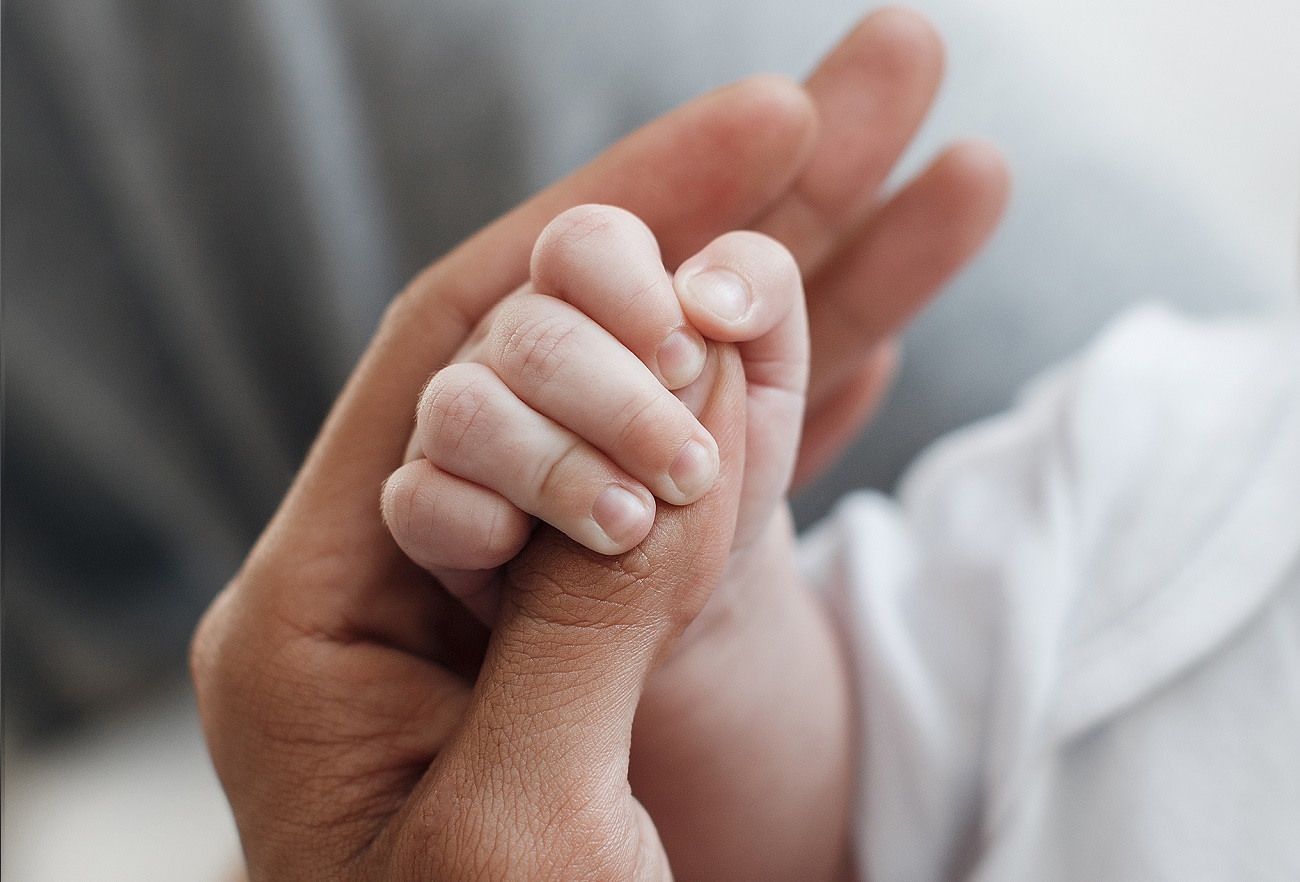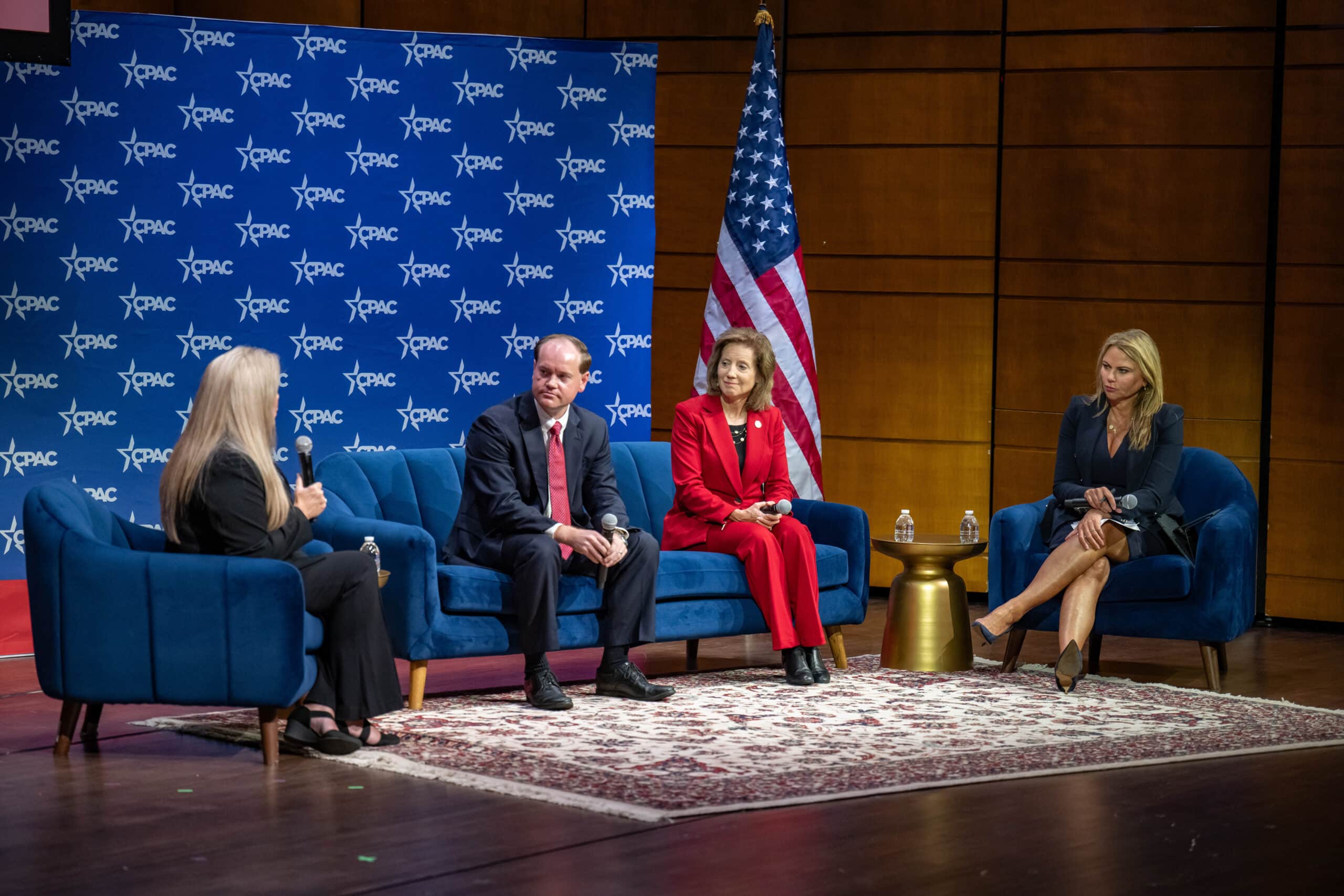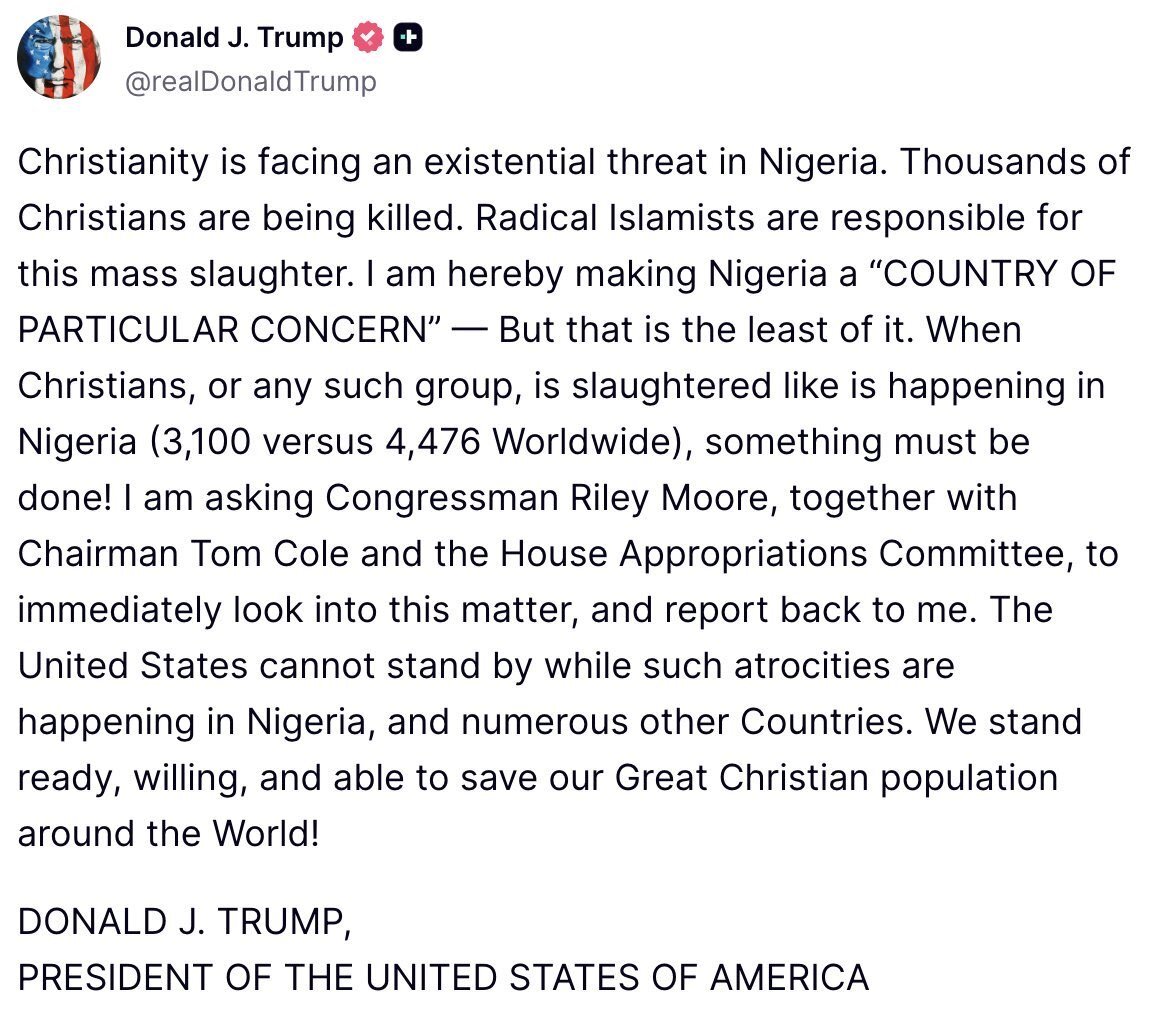Members of the European Parliament, human rights advocates, and survivors of persecution gathered at the European Parliament on December 4th to spotlight the escalating violence and discrimination faced by Christian communities across South Asia.
Continue readingU.S. Congress Holds Roundtable on Nigeria’s Christian Persecution Crisis Ahead of Report to President Trump
- Congressional leaders met in Washington, D.C. to evaluate urgent policy steps to confront escalating persecution of Christians in Nigeria.
- ADF International’s Sean Nelson contributed expert legal analysis to support policymakers’ next steps in anticipation of an upcoming report to President Trump on Nigeria.
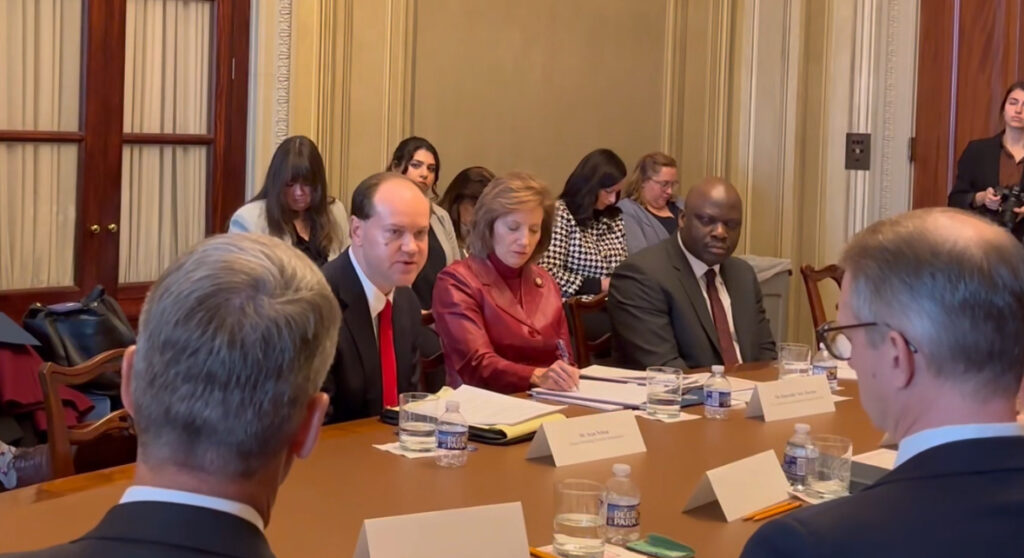
WASHINGTON, D.C. (December 2) — The House Appropriations Committee today hosted a Congressional roundtable focused on the United States’ next steps for addressing the severe crisis of Christian persecution in Nigeria. Appointed by President Trump to develop policy recommendations, the committee heard from leading Members of Congress, including Rep. Riley Moore (R-WV), Rep. Chris Smith (R-NJ), Rep. Mario Díaz-Balart (R-FL), Rep. Brian Mast (R-FL), and Rep. Robert Aderholt (R-AL). ADF International’s Sean Nelson, Senior Counsel for Global Religious Freedom, joined the roundtable to deliver expert remarks. Other expert panelists included U.S. Commission on International Religious Freedom Chair Vicky Hartzler and Dr. Ebenezer Obadare with the Council on Foreign Relations.
During the discussion, Congressmembers examined urgent legislative and diplomatic measures to respond to mounting evidence of targeted violence against Christians. Nigeria remains one of the most dangerous countries in the world to practise the Christian faith, with extremist groups and armed militias responsible for thousands of killings, mass abductions, and widespread destruction of churches and communities. Despite the scale of the atrocities, perpetrators continue to operate with impunity.
“This is a real opportunity to stop in large measure one of the worst persecution situations in the world. We do not have to wait until it is too late. We can act, with a real chance of success, now,” Nelson stated in his remarks.
“This is a real opportunity to stop in large measure one of the worst persecution situations in the world. We do not have to wait until it is too late. We can act, with a real chance of success, now."
- Sean Nelson, Senior Counsel for Global Religious Freedom at ADF International
Nelson’s remarks follow his appearance at a November United Nations event hosted by the U.S. Mission to the UN, in which Nelson provided commentary on an expert panel on the plight of Christina in Nigeria, alongside Ambassador Mike Waltz, FOX’s Harris Faulkner, and singer Nicki Minaj, who has used her platform to become a major advocate for Nigerian Christians.
U.S. Policymakers Assess Concrete Measures to Respond to Targeted Violence
Experts reminded policymakers of longstanding calls for decisive U.S. action. In October 2025, the Trump Administration redesignated Nigeria as a “Country of Particular Concern” (CPC), marking a major step toward mobilising a U.S. government response to the increasing attacks on Christians in the country.
Additional recommendations discussed at the roundtable included: (1) Increasing security, especially in the Middle Belt where Christians face the most persecution from Fulani militants, and effectively respond to early warnings. (2) Ending impunity by vigorously prosecuting individuals responsible for attacks against Christians and others, and investigating and disciplining officials who have turned a blind eye. (3) Facilitating the safe return of millions of internally displaced persons (IDPs) to their communities, and prioritizing reconstruction of churches, schools, and homes destroyed in attacks. (4) Stopping enforcement of and repealing the blasphemy laws, as well as prosecuting mob attacks.
This follows a November letter addressed to U.S. President Donald Trump, in which a coalition of religious freedom experts and advocates proposed next steps for the Nigerian government to protect persecuted Christians.
“Our brothers and sisters in Christ are being persecuted and slaughtered in Nigeria simply for professing their faith in our Lord and Savior Jesus Christ. That’s why President Trump designated Nigeria as a Country of Particular Concern, and why he asked me, along with the House Committee on Appropriations, to look into the horrific persecution of Christians in Nigeria. I’m grateful to Chairman Diaz-Balart for convening this critical discussion to receive expert testimony on the crisis in Nigeria.
I’m particularly grateful for the work that Sean Nelson and the Alliance Defending Freedom International has done in defending Christians in Nigeria and raising awareness of the horrific conditions Christians in Nigeria face,” said Representative Riley Moore.
“Today’s discussion is an important dialogue to ensure we have a full picture of the ongoing crisis Nigerian Christians face every day. The world will no longer turn a blind eye to the persecution of Christians in Nigeria.”
Christian Persecution in Nigeria
Nigeria remains one of the most dangerous places in the world to be a Christian. In 2025 alone, according to one estimate, more than 7,000 Christians have been killed for their faith. Since Boko Haram launched its insurgency in 2009, estimates indicate that between 50,000 and 100,000 Christians have lost their lives due to religiously motivated violence.
The destruction of churches has become a defining feature of the crisis, with thousands of churches attacked or destroyed in recent years. In the central regions of Benue and Plateau States the situation has worsened dramatically, with more than 9,500 people, mostly Christians, killed between May 2023 and May 2025, and around 500,000 individuals newly displaced from their homes due to targeted attacks.
Advocacy for Nigeria’s Persecuted Christians
ADF International advocates for Christians and other religious minorities who face severe persecution across Nigeria. The organization has provided legal support for multiple individuals targeted under blasphemy laws or attacked for their faith.
ADF International supported the legal defense of Rhoda Jatau, a Christian mother imprisoned for 19 months after allegedly sharing a video condemning the brutal lynching of Christian college student Deborah Emmanuel Yakubu. Jatau was fully acquitted in December 2024, marking an important victory for justice and free expression.
ADF International also backed the successful appeal of *David (name changed for security reasons)*, a Christian man who was wrongfully convicted and suffered torture after helping a convert escape violent threats. A Nigerian High Court ultimately overturned his conviction, acknowledging the injustices he endured.
Today, ADF International continues its support for Yahaya Sharif-Aminu, a Sufi musician imprisoned for over five years after a WhatsApp message deemed blasphemous. Facing a death sentence, Sharif-Aminu is now awaiting his next hearing before the Supreme Court of Nigeria, and his case may be heard and decided in the coming months. Sharif-Aminu’s case has the potential to abolish Nigeria’s blasphemy laws, which embolden mob violence and fuel the climate of hostility facing Christians and other vulnerable groups.
South Australia mother to take legal action after teen daughter exposed to “disturbing” sex ed content
- Third party education provider “headspace” exposed children to pictures of “trans” bodies with double mastectomy scars in lesson about sexuality
- Nicki Gaylard, mother of 6, is now homeschooling her children and is ready to take legal action against the Department of Education – “Let children be children”

ADELAIDE (2 December) – Mother of six, Nicki Gaylard, is “strongly considering” legal action against the Department of Education following a presentation that exposed Year 9 girls – including her daughter, aged 14 – to highly inappropriate and explicit sexual content without parental knowledge or consent.
Year 9 girls, including Nicki’s daughter Courtney, were removed from regular lessons and placed into an unsupervised presentation facilitated by external personnel. During this session, the girls report being shown sexually explicit material and hearing graphic references that left them distressed and confused.
"I'm looking to take this forward for the sake of other kids across the country who shouldn't have to go through what my daughter went through; and for all the parents who should never be sidestepped in this way."
- Nicki Gaylard
The presenters made reference to practices including bestiality, telling the girls “don’t Google it though”. The presentation also included people who have sex with siblings, with presenters using the terms “sister love” and “brother love”.
During the lesson, which emphasized themes of diversity and acceptance, images were put on the screen to show the children “trans bodies” – displaying bodies from the waist-up, where scars from double mastectomies were visible.
The school did not inform parents ahead of this session, nor did they provide any opportunity to consent or withdraw their children.
Following the incident, Nicki Gaylard withdrew her children from the school, stating that she could not risk their exposure to unsupervised and inappropriate sexual content within the school environment.
Despite having presented the content across multiple schools, third-party education provider, “headspace”, has refused to allow Nicki access to view the PowerPoint.
Nicki Gaylard said: “I am strongly considering taking this case forward because I’m seeking justice for my daughter, who was deeply affected by what she saw that day. Her childhood was shortened through exposure to completely inappropriate material that headspace won’t even let me see. How can they be happy to show to children what they are ashamed to show to adults? Let children be children.
“I’m also looking to take this forward for the sake of other kids across the country who shouldn’t have to go through what my daughter went through; and for all the parents who should never be sidestepped in this way. That is, after all, our right and our duty as parents – and school authorities should respect our authority to determine what’s appropriate for our kids.”
Robert Clarke, Director of Advocacy for ADF International, supporting Gaylard’s case, said: “Parents send their children to school expecting an education and them to be kept safe, not exposure to explicit sexual content. Yet that basic trust was broken. No parent should be kept in the dark about what their child is being taught, and no child should be placed in an unsupervised session dealing with adult themes.”
“Sadly, Nicki’s case is an example of a larger pattern. Increasingly, parents are discovering that radical approaches to sex education – often shaped by internationally-developed curricula and promoted by activist groups at the national level – are being quietly rolled out. This case is about drawing a firm line: parental rights matter, transparency matters, and safeguarding children is not optional.”
The Department of Education has acknowledged procedural failures, confirming that parents were not notified; required vetting processes were not followed; no teacher was present; and an investigation is underway into the third-party presenter.
Images for free use in print or online in relation to this story only
Photos by Giovanni Portello / ADF International
EU ignores free speech concerns in review of censorial Digital Services Act
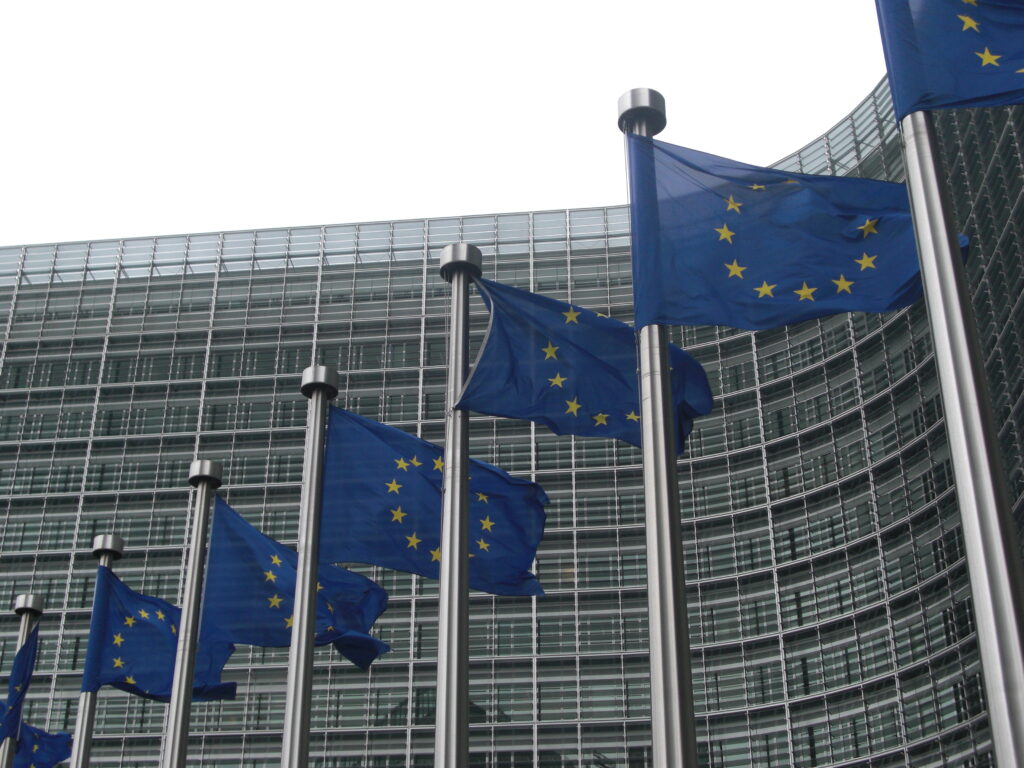
More than 100 global free speech experts last month sent a letter to the European Commission, coordinated by ADF International, warning of global censorship under DSA
Now, the European Commission has failed to address censorship concerns in its formal review, published yesterday; the Commission responded to experts’ letter just days ahead of the review, denying threats to free speech
BRUSSELS (20 November 2025) – The European Commission has ignored substantive free speech concerns from experts from around the world in its first formal report on the Digital Service Act (DSA), published yesterday.
The review, mandated by Article 91 of the DSA itself, came amidst widespread international outcry that the legislation violates freedom of expression, including from major online platforms, European civil society, the House Judiciary Committee of the U.S. Congress, the U.S. Ambassador to the EU, and others.
In September, more than 50 European NGOs stressed that the broad terms of “systemic risks,” “disinformation,” and “illegal content,” coupled with the activist role of “trusted flaggers” might violate freedom of expression and information under Article 11 of the EU Charter of Fundamental Rights. Last month, over 100 free speech warned about global online censorship under the DSA, in a letter to the Commission coordinated by ADF International.
“The Commission has missed an extremely critical opportunity to restore free speech and to engage constructively with its citizens."
- Adina Portaru, Senior Counsel, Europe, for ADF International
The free speech experts’ letter called on the Commission to address these free speech concerns in its review of the DSA, which was published yesterday, but the Commission has now failed to do so in its report.
Instead, the report reiterates the Commission’s position that the DSA is “content-agnostic” and therefore beyond free-speech scrutiny. This stance is at odds with the DSA’s real-world enforcement, which pressures platforms to remove content to avoid punishment from the EU, which can result in fines of up to 6% of global revenue. The report provides no substantive response to the concerns around censorship-by-proxy, overreach, or the DSA’s extraterritorial effects, nor does it assess the DSA under the EU Charter’s free speech protections, as requested by experts and NGOs.
More alarmingly, the Commission further signals its intention to deepen and tighten DSA-related coordination, calling for stronger inter-authority cooperation, joint guidance, and even potential “one-stop-shop” mechanisms across the EU, a development that risks amplifying existing free-speech concerns rather than addressing them.
Reacting to the DSA review, Senior Counsel, Europe for ADF International, Dr Adina Portaru said: “It is alarming that the European Commission has disregarded well-founded censorship concerns and overreach, expressed by international free speech experts, big tech, and concerned governments alike in its review of the DSA. The Commission has indicated that they will address free speech in future reviews ( in 2027); however, the threat of censorship should not be taken lightly and addressing its effects cannot be delayed.
“The DSA could install a global censorship regime and is the greatest threat to online freedom of expression in the Western world today. We will continue to advocate for the protection of free speech in light of the DSA’s censorial threat in order to keep the digital public square free.”
Free speech concerns from US government and big tech companies
The Commission’s report fails to address transatlantic free-speech concerns, despite growing tension around the DSA’s global effects.
In September, US Ambassador to the EU Andrew Puzder expressed concern that the DSA risks censoring American citizens. This followed an August directive from US Secretary of State Marco Rubio to US diplomats in Europe to prioritize diplomatic efforts to challenge the DSA.
X and Google have issued similar warnings about the potentially global censorship impact of the DSA.
Ambassador Puzder also said: “No President of either party, and I can tell you President Trump in particular, is going to tolerate a foreign government restricting the First Amendment fundamental free speech, free expression rights of American citizens, to an extent that the United States government can’t even regulate those rights.
“So we need to come to an understanding as to what’s happening with the Digital Services Act.”
Ambassador Puzder also reportedly said the United States would make formal submissions under the European Commission’s review of the DSA.
Free speech experts’ letter to European Commission
Last month, 113 experts, including a former VP of Yahoo Europe, a former US Senator, and politicians, academics, lawyers and journalists from around the globe, wrote to the Commission, calling on it to consult free speech experts as part of its review into the DSA.
The letter, which was coordinated by ADF International, said: “[The DSA] constructs a pan-European censorship infrastructure with loosely defined boundaries and the potential to suppress legitimate democratic discourse…
“The wide definition of illegal content allows the most speech-restrictive provisions of one single EU country to be imposed as a standard across the entire Union, and potentially worldwide, effectively importing the lowest common denominator of expression.”
The letter added: “The broad definition of ‘illegal content’ in the DSA, combined with existing jurisprudence of the Court of Justice of the European Union (CJEU) opens the door to worldwide takedowns.”
The letter expressed concern over the European Commission’s opaque review process into the DSA and called on the Commission to: “Conduct a comprehensive and inclusive consultation with independent experts in freedom of expression, constitutional law, and digital rights, ahead of the November review, inviting public comments.
“Publicly disclose the list of NGOs, civil society actors, and partner entities engaged in the review process, including the criteria and methodology used for their selection.
“Ensure that the review includes a rigorous legal analysis of the DSA’s compatibility with fundamental rights protections, especially under Article 11 of the Charter of Fundamental Rights of the EU, Article 10 of the ECHR, and Article 19 of the ICCPR.”
In the Commission’s response to the letter, it stated that, “the DSA does not regulate specific speech as it is content agnostic” and that “competent authorities…have no power to moderate user content or to impose any specific content moderation approach on online platforms.”
“Claiming that the Commission is ‘not moderating’ because it does not press the delete button itself is disingenuous. Platforms respond to Commission pressure, and the Commission is fully aware of the practical consequences of the extraordinary amount of pressure it exerts. The response letter to the free speech experts’ concerns never addresses this indirect but powerful influence.
“The Commission’s response simply ignores that its own enforcement actions are based not on agnostic principles but on contested normative determinations about which speech categories create systemic risks. In effect: the DSA cannot be content-agnostic when its entire enforcement architecture revolves around evaluating how platforms treat specific content types, even if the law avoids explicitly naming them,” responded Dr Portaru.
“Further, the Commission has entirely dismissed the very valid concerns of extraterritorial reach despite the clear global threat of the DSA. The response fails to address repeated concerns from international partners, including the U.S., that the DSA incentivises de facto global moderation policies. The Commission has missed an extremely critical opportunity to restore free speech and to engage constructively with its citizens on the DSA’s impact on fundamental rights,” Portaru continued. Read the free speech experts’ letter and see the full list of signatories here.
Images for free use in print or online in relation to this story only
Pictured: Adina Portaru
Experts convene at European Parliament to address harms of surrogacy, following EU resolution condemning practice
- International momentum against surrogacy grows, as European Parliament and UN condemn practice
- Experts today in European Parliament, including UN Special Rapporteur on Violence Against Women and Girls, Reem Alsalem and ADF International’s Carmen Correas, highlighted harms of surrogacy for women and children
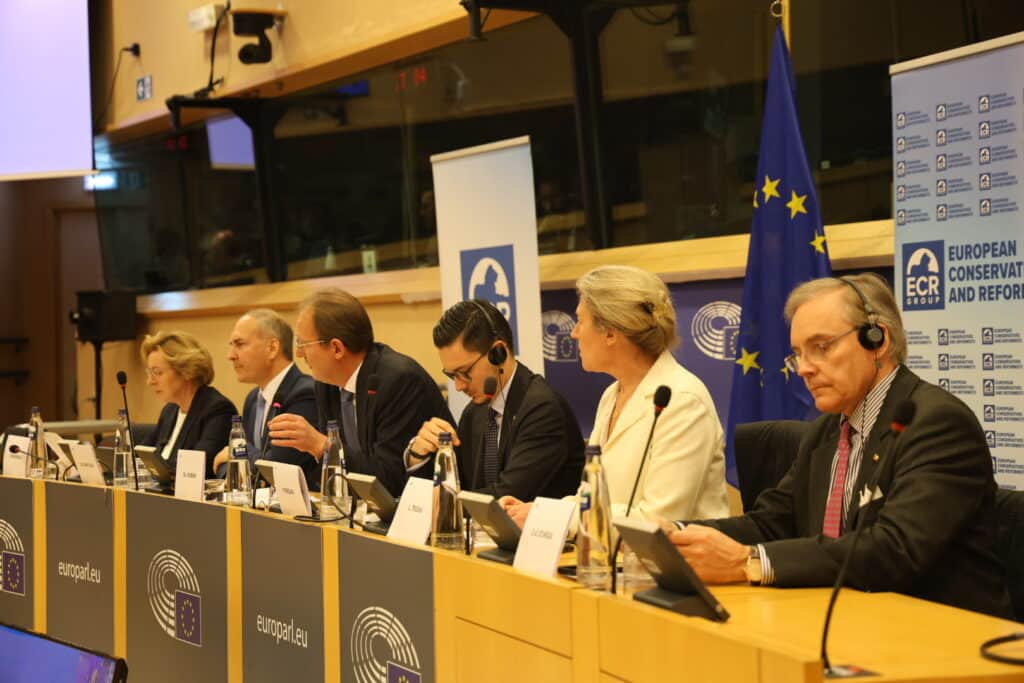
Brussels (19 November 2025) – Today, experts convened at the European Parliament to highlight human rights concerns surrounding surrogacy, with the UN Special Rapporteur on Violence Against Women and Girls featured as a speaker.
Speakers at the event, hosted by the European Conservatives and Reformists (ECR) Party, included the UN Special Rapporteur Reem Alsalem, Advocacy Officer at ADF International Carmen Correas, a former EU Commissioner, an Italian government minister and representatives of civil society organisations.
The event, entitled “Surrogacy: An Ethical and Political Challenge for Europe”, follows a recent EU resolution condemning surrogacy and comes on the heels of a landmark United Nations report by Ms Alsalem, calling for the global abolition of the practice.
Ms Correas said: “Surrogacy treats women and children as commodities. The European Union has taken an important step in acknowledging its inherent harms. We urge policymakers to move swiftly toward a clear, coordinated legal prohibition that protects the dignity and rights of all involved.”
Italian ECR Member of the European Parliament Paolo Inselvini, a speaker at today’s event, said: “Today it became clear that a determined European front exists, committed to stopping reproductive exploitation across the globe. We will therefore continue to fight so that Europe abandons all ambiguity and assumes a clear responsibility: surrogacy must be a universal crime.”
EU resolution on surrogacy
On 13 November, the EU passed a resolution stating that the EU: “Condemns the practice of surrogacy, which involves the reproductive exploitation and use of women’s bodies for financial or other gain, in particular in the case of especially vulnerable women in third countries; calls on the Commission to take measures to support ending this phenomenon.”
Landmark UN report
The European Parliament event follows a major development at the United Nations last month. In her report to the UN General Assembly, Ms Alsalem called for a legally binding international instrument that would lead to the abolition of all forms of surrogacy, emphasising that the practice is “characterized by exploitation and violence against women and children”.
The UN expert highlights that surrogacy:
- intentionally separates children from their mothers,
- commodifies women’s reproductive capacities,
- prioritises adult desires over the rights of the child, and
- exposes women to heightened physical, psychological, and financial risks.
The surrogacy industry is rapidly expanding—valued at $14.4 billion in 2023 and projected to reach $96.6 billion by 2033—while surrogate mothers bear the vast majority of the risks and receive only a fraction of the profits.
Widespread civil society support for banning surrogacy
ADF International joined over 180 NGOs in endorsing a civil society letter supporting the Special Rapporteur’s recommendations and has consistently advocated for national and international legal protections that safeguard women and children from exploitation.
“States must act decisively to end the grave human rights violations inherent in surrogacy. A coordinated international response—including a UN treaty—is urgently needed,” said Giorgio Mazzoli, Director of UN Advocacy at ADF International, responding to the UN report earlier this month.
US Government Brings Plight of Persecuted Christians in Nigeria to the United Nations
- U.S. officials, including Ambassador Mike Waltz, singer Nicki Minaj, and religious freedom advocates elevate urgent concerns over rising anti-Christian violence in Nigeria.
- ADF International representative joined panel of religious freedom experts, calling for continued U.S. and global action to protect Christians in Nigeria.
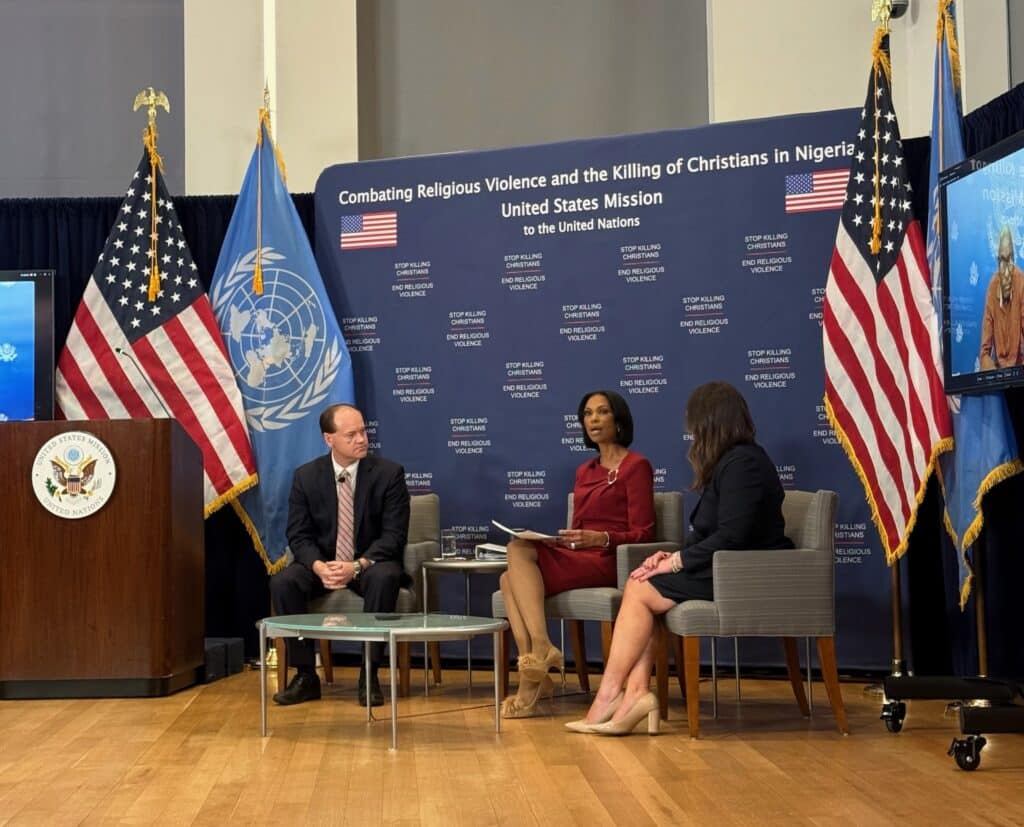
NEW YORK CITY (18 November 2025) – At an event hosted today by the United States Mission to the United Nations (USUN), religious freedom advocates and experts convened to highlight the escalating threats facing Christians in Nigeria. The event emphasized the need for sustained U.S. leadership and international action to address the crisis. Featured speakers included U.S. Ambassador to the UN Mike Waltz; singer Nicki Minaj, who has recently spoken out in support of persecuted Christians in Nigeria; and Sean Nelson, Senior Counsel for Global Religious Freedom at ADF International, joining a panel hosted by Fox News anchor Harris Faulkner. The panel also included remarks by Rev. Gabriel Makan, a pastor from Northern Nigeria, and Sarah Makin, former Senior Advisor to the President of the United State on International Religious Freedom.
The speakers called for greater recognition of the targeted and widespread persecution facing Christians in Nigeria, renewed diplomatic engagement and greater actions from Nigeria to support persecuted Christians, and stronger international measures to protect vulnerable communities and uphold the fundamental right to freedom of religion or belief.
“This event demonstrates clearly that the United States under President Trump’s leadership will not turn a blind eye towards the persecution of Christians in Nigeria and worldwide, but instead will press ever harder to ensure that the entire world knows about, and takes action on, the grave persecution of Christians,” Sean Nelson.
“We are grateful that the Trump administration continues to elevate the persecution of Christians, call for the Nigerian government to stop the denials and see the CPC designation as an opportunity for greater support to end the persecution and insecurity, and appreciate well-known public figures like Nicki Minaj using their platforms to bring much-needed awareness to this dire crisis.”
“This event demonstrates clearly that the United States under President Trump’s leadership will not turn a blind eye towards the persecution of Christians in Nigeria and worldwide, but instead will press ever harder to ensure that the entire world knows about, and takes action on, the grave persecution of Christians."
- Sean Nelson, Senior Counsel for Global Religious Freedom at ADF International
Continued Action from U.S.
Religious freedom experts have long advocated for the U.S. government to address the worsening situation in Nigeria. On 31 October 2025, the Trump Administration redesignated Nigeria as a “Country of Particular Concern (CPC), marking a major step forward for protecting persecuted Christians in the country.
“Protecting Christians is not about politics – it is a moral duty,” Ambassador Waltz said in his opening remarks. “We need voices that pierce the silence we have heard from the international community, that humanize the statistics we keep hearing, and demand accountability.”
Advocates are now calling for continued action from the U.S. following the CPC designation. In a coalition letter thanking President Trump for his actions on Nigeria, signatories highlight the key steps necessary for Nigeria to undertake to protect persecuted communities, including: 1) increased security and reliable early warning systems for Christian communities, particularly in the Middle Belt where Fulani militant attacks are the worst; 2) swift prosecution for attackers; 3) facilitating the safe return of internally-displaced persons; and 4) repealing the country’s draconian Sharia blasphemy laws. By pressing for these measures, advocates aim to guarantee that the CPC designation leads to tangible improvements for Nigeria’s persecuted Christians and lasting protections for religious freedom.
In addition to experts and officials, public figures have continued to speak out against the anti-Christian violence taking place in Nigeria. Among these are Bill Maher, who drew attention to the issue in late September, sparking widespread online discussion.
Singer Nicki Minaj has been vocal online about the crisis, leading to her appearance on today’s panel.
Following the Trump administration’s CPC designation, Minaj tweeted, “Reading this made me feel a deep sense of gratitude. We live in a country where we can freely worship God. No group should ever be persecuted for practicing their religion. We don’t have to share the same beliefs in order for us to respect each other. Numerous countries all around the world are being affected by this horror & it’s dangerous to pretend we don’t notice. Thank you to The President and his team for taking this seriously. God bless every persecuted Christian. Let’s remember to lift them up in prayer.”
Christian Persecution in Nigeria
Nigeria remains one of the most dangerous places in the world to be a Christian. In 2025 alone, more than 7,000 Christians have been killed for their faith, with an average of 35 murdered every single day. Since Boko Haram launched its insurgency in 2009, estimates indicate that between 50,000 and 100,000 Christians have lost their lives due to religiously motivated violence.
The destruction of churches has become a defining feature of the crisis, with over 19,000 churches attacked or destroyed in recent years. In the central regions of Benue and Plateau States the situation has worsened dramatically, with more than 9,500 people, mostly Christians, killed between May 2023 and May 2025, and around 500,000 individuals newly displaced from their homes due to targeted attacks.
Advocacy for Nigeria’s Persecuted Christians
ADF International advocates for Christians and other religious minorities who face severe persecution across Nigeria. The organization has supported multiple individuals targeted under blasphemy laws or attacked for their faith.
ADF International supported the legal defense of Rhoda Jatau, a Christian mother imprisoned for 19 months after allegedly sharing a video condemning the brutal lynching of Christian college student Deborah Emmanuel Yakubu. Jatau was fully acquitted in December 2024, marking an important victory for justice and free expression.
ADF International also backed the successful appeal of *David (name changed for security reasons)*, a Christian man who was wrongfully convicted and suffered torture after helping a convert escape violent threats. A Nigerian High Court ultimately overturned his conviction, acknowledging the injustices he endured.
Today, ADF International continues its support for Yahaya Sharif-Aminu, a Sufi musician imprisoned for over five years after a WhatsApp message deemed blasphemous. Previously sentenced to death, Sharif-Aminu is now awaiting his next hearing before the Supreme Court of Nigeria, and his case may be heard and decided in the coming months. Sharif-Aminu’s case has the potential to abolish Nigeria’s blasphemy laws, which embolden mob violence and fuel the climate of hostility facing Christians and other vulnerable groups.
European Court of Human Rights Undermines Right to Life for the Disabled Unborn in Polish Case
The European Court of Human Rights has ruled against Poland following a challenge brought by a woman who had travelled abroad for an abortion after the country’s Constitutional Tribunal struck down eugenic abortion in 2020.
Continue readingReligious Freedom Coalition Thanks President Trump for Designating Nigeria “Country of Particular Concern;” Proposes Next Steps to Protect Persecuted Christians”
- In letter thanking President Trump, coalition of international religious freedom experts and faith leaders outlines key recommendations to respond to crisis facing persecuted Christians in Nigeria.
- ADF International joins the call, urging continued U.S. leadership and global action to defend religious freedom in Nigeria and beyond.
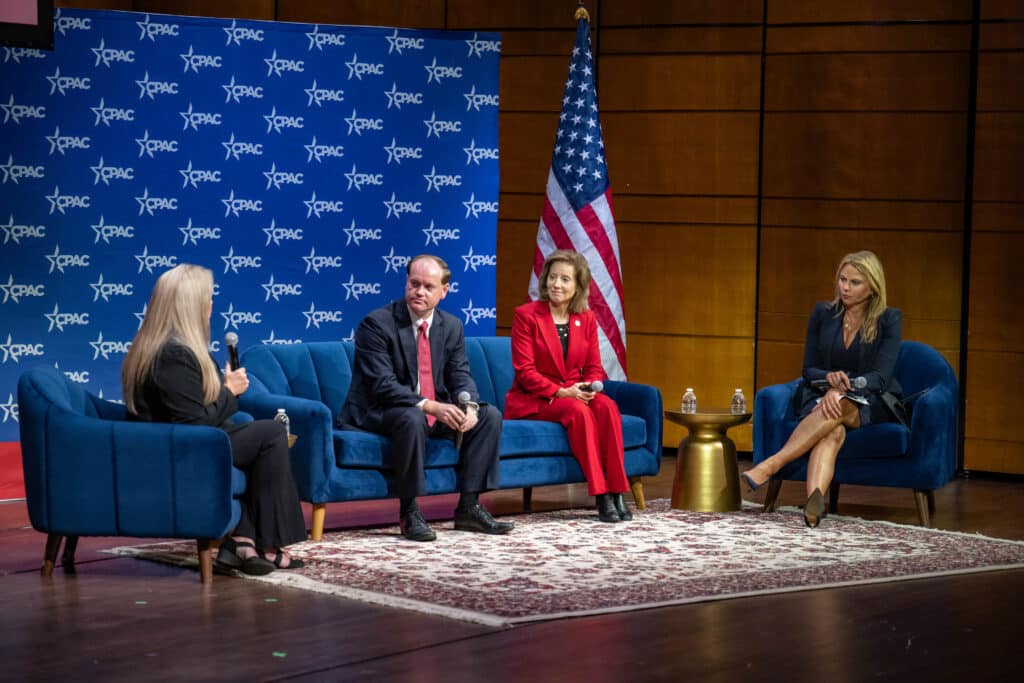
WASHINGTON D.C. (November 13) — A coalition of 48 faith leaders and religious freedom experts has sent a letter to U.S. President Donald Trump, thanking him for his decisive action in designating Nigeria as a Country of Particular Concern (CPC), stating, “You saw the evidence, you listened to the cries of the persecuted, and you acted.”
The letter urges continued United States’ leadership on international religious freedom. In it, signatories emphasize that swift action from the U.S. is indispensable as Christians in Nigeria continue to face relentless violence from terrorist groups. The letter reflects a unified commitment to four recommended key policy goals that Nigeria, following increased pressure from the U.S., should commit to if it is to be removed from the CPC designation: 1) increased security and reliable early warning systems for Christian communities, particularly in the Middle Belt where Fulani militant attacks are the worst; 2) swift prosecution for attackers; 3) facilitating the safe return of internally-displaced persons; and 4) repealing the country’s draconian Sharia blasphemy laws.
“The administration’s decision to redesignate Nigeria as a Country of Particular Concern is a momentous step forward for international religious freedom,” said Sean Nelson, Senior Counsel for ADF International. “Christians and other vulnerable communities in Nigeria have endured unthinkable violence for far too long. While there is still much work ahead, this decisive action renews hope that real protection and accountability are on the horizon. The President’s commitment to Nigeria can serve as a model to protect persecuted Christians worldwide, as Christians are the most persecuted religious group globally.”
“The administration’s decision to redesignate Nigeria as a Country of Particular Concern is a momentous step forward for international religious freedom. While there is still much work ahead, this decisive action renews hope that real protection and accountability are on the horizon. The President’s commitment to Nigeria can serve as a model to protect persecuted Christians worldwide, as Christians are the most persecuted religious group globally."
- Sean Nelson, Senior Counsel for Global Religious Freedom at ADF International
Signatories to the letter include top leaders in the movement to end global Christian persecution, including Alliance Defending Freedom President & CEO Kristen Waggoner, Matt and Mercedes Schlapp of the CPAC Foundation, former Congressman Frank Wolf, former Senior Advisor to the President on International Religious Freedom Sarah Makin, President of Family Research Council and former Chair of the U.S. Commission on International Religious Freedom Tony Perkins, President & CEO of Concerned Women for America Penny Nance, President & CEO of CatholicVote Kelsey Reinhardt, Director of the Hudson Institute’s Center for Religious Freedom Nina Shea, and many others. The letter was developed through the CPAC Christian Persecution Coalition. In addition to highlighting the crisis in Nigeria, the letter urges President Trump to “continue to make the defense of religious freedom internationally a core U.S. foreign policy priority” and to “continue and even elevate” the defense of persecuted Christians worldwide.
“We commend your recognition of the major threat and devastation facing Christians in Nigeria from radical Islamists and a government that has taken little action to protect them, as well as your clear-eyed statements placing all available Presidential actions on the table to ensure that action is taken soon,” the letter reads.
Christian Persecution in Nigeria
Nigeria remains one of the most dangerous places in the world to be a Christian. In 2025 alone, more than 7,000 Christians have been killed for their faith, with an average of 35 murdered every single day. Since Boko Haram launched its insurgency in 2009, estimates indicate that between 50,000 and 100,000 Christians have lost their lives due to religiously motivated violence.
The destruction of churches has become a defining feature of the crisis, with over 19,000 churches attacked or destroyed in recent years. In the central regions of Benue and Plateau States the situation has worsened dramatically, with more than 9,500 people, mostly Christians, killed between May 2023 and May 2025, and around 500,000 individuals newly displaced from their homes due to targeted attacks.
“The numbers we have seen in Nigeria are alarming. With the renewed CPC designation for Nigeria, we are hopeful that this will bring about real change. The letter to the president, which ADF International gladly has joined, acknowledges the horrors that Christians have faced for years and paints a picture of what a path toward protecting them and religious freedom for all can look like,” said Kelsey Zorzi, Director of Advocacy for ADF International.
Advocacy for Nigeria’s Persecuted Christians
ADF International continues to advocate for Christians and other religious minorities who face severe persecution across Nigeria. The organization has supported multiple individuals targeted under blasphemy laws or attacked for their faith.
One such case is that of Rhoda Jatau, a Christian mother imprisoned for 19 months after allegedly sharing a video condemning the brutal lynching of Christian college student Deborah Emmanuel Yakubu. With legal support from ADF International, Jatau was fully acquitted in December 2024, marking an important victory for justice and free expression.
ADF International also backed the successful appeal of *David (name changed for security reasons)*, a Christian man who was wrongfully convicted and suffered torture after helping a convert escape violent threats. A Nigerian High Court ultimately overturned his conviction, acknowledging the injustices he endured.
Today, ADF International continues its support for Yahaya Sharif-Aminu, a Sufi musician imprisoned for over five years after a WhatsApp message deemed blasphemous. Once sentenced to death, Sharif-Aminu is now awaiting his next hearing before the Supreme Court of Nigeria, and his case may be heard and decided in the coming months. Sharif-Aminu’s case has the potential to abolish Nigeria’s harsh blasphemy laws, which embolden mob violence and fuel the climate of hostility facing Christians and other vulnerable groups.
Global Advocacy for Persecuted Christians
The coalition letter underscores that the crisis in Nigeria reflects a broader global trend of growing hostility toward Christians. ADF International supports numerous cases across the world, advocating for the right to freely live out one’s faith.
The letter states, “We see atrocities and grave violations being committed worldwide, from Nicaragua to the Democratic Republic of Congo and Sudan, from Algeria to Syria to China, and in so many other places.” In Nicaragua, ADF International has represented Christian pastors punished for their faith. In Sudan, the organization has advocated for Christians targeted for conversion to the faith. The letter also highlights Algeria, where nearly every Protestant church has been closed by the government. Amid this crackdown, Pastor Youssef Ourahmane faces prosecution before the country’s Supreme Court for leading Christian worship, with a potential prison sentence.
The letter also warns that even in democratic societies, Christians increasingly face pressure and punishment for expressing their beliefs. Cases like Päivi Räsänen in Finland and Adam Smith-Connor in the United Kingdom show how legal and social pressures are mounting against Christians, even in places where religious freedom is traditionally protected.
“The U.S. should stand as a beacon for the fundamental right to religious freedom and a voice for persecuted Christians globally, because if we do not stand, no one else will,” the letter concludes. “We ask that you continue to make the defense of religious freedom internationally a core U.S. foreign policy priority, and that you continue and even elevate your defense of persecuted Christians worldwide.”
Sie sehen gerade einen Platzhalterinhalt von YouTube. Um auf den eigentlichen Inhalt zuzugreifen, klicken Sie auf die Schaltfläche unten. Bitte beachten Sie, dass dabei Daten an Drittanbieter weitergegeben werden.
Mehr InformationenU.S. Congress Introduces Resolution Condemning Persecution of Christians in Nigeria
- Resolution urges U.S. and international action to protect Nigerian Christians amid widespread religious persecution
- ADF International endorses the resolution and applauds the call to further protect religious freedom in Nigeria following the Trump administration’s move to designate it as a “Country of Particular Concern”

WASHINGTON, D.C. (4 November 2025) – Today, U.S. Congressman Riley Moore (R-WV) introduced a resolution condemning the ongoing persecution of Christians in Nigeria and calling for urgent action following the United States government’s recent designation of Nigeria as a “Country of Particular Concern” (CPC). President Donald Trump recently asked Congressman Moore and the House Appropriations Committee to lead Congressional investigations and recommendations to combat the persecution of Christians in Nigeria. The designation recognizes the severe and systematic violations of religious freedom facing Nigerian Christians and opens the door for strong diplomatic and other measures to hold perpetrators accountable.
“Jihadists are carrying out a systematic campaign of widespread religiously-motivated attacks against Nigerian Christians. The evidence is overwhelming: targeted killings, massacres during holy days, and a death toll that exceeds the rest of the world combined,” said Sean Nelson, Senior Counsel for Global Religious Freedom at ADF International.
“We commend Congressman Moore for this decisive leadership in response to the President’s clarion call to defend persecuted Christians in Nigeria and globally. The United States must use every diplomatic and economic tool available to ensure that Christians in Nigeria can live and worship without fear of violence or death."
- Sean Nelson, Senior Counsel for Global Religious Freedom at ADF International
The resolution identifies “Boko Haram, the Islamic State West Africa Province, and Fulani militant groups” as the main jihadist groups targeting Christians in Nigeria, while also describing “the Nigerian Government’s failure to act in defense of Christians.” The resolution calls on the U.S. to pressure the Nigerian government to end impunity for attacks, proactively protect Christian communities and clergy from attacks, return internally-displaced persons to their homelands, and repeal the country’s draconian blasphemy laws and release prisoners detained for their faith. The resolution also calls for the delivery of humanity aid directly to victims in coordination with international nongovernmental and faith-based organizations
Moore has previously introduced legislative measures addressing violations of religious freedom, underscoring the global crisis of Christian persecution. Today’s resolution continues that effort and reinforces bipartisan congressional concern regarding Nigeria’s record numbers of Christian deaths and violations against religious freedom.
“This resolution condemns the horrific persecution of Christians in Nigeria. For far too long, the world has turned a blind eye to the suffering of innocent Christians—entire villages destroyed, churches burned, pastors tortured, families torn apart. This grave suffering must end now,” said Representative Riley Moore.
“I’m calling on all my colleagues – both Republican and Democrat alike – to unite in defense of faith and freedom. The United States must make it clear that we will not tolerate the slaughter of Christians or the persecution of anyone for their belief in Jesus Christ. I want to thank President Trump for his bold and unwavering leadership in defense of Christians in Nigeria. His official designation of Nigeria as a Country of Particular Concern will save the lives of thousands of Christians.”
The U.S. Congress has taken significant notice of the situation in Nigeria following the Trump administration’s designation of the country as a CPC. Congressman Chris Smith (R-NJ), who for years has led efforts to highlight the issue of religious persecution in Nigeria within Congress, introduced a resolution earlier this week affirming support for Nigeria’s CPC status. In addition, thirty-one members of the House Values Action Team have issued statements commending the designation.
Background
Recent estimates indicate that more than 7,000 Christians have been killed for their faith in 2025 alone — an average of 35 Christians murdered every day — adding to the more than 50,000–100,000 Christian deaths since Boko Haram’s insurgency began in 2009. More than 19,000 churches have been attacked or destroyed, and in Benue and Plateau States alone, more than 9,500 individuals, mostly Christians, were killed between May 2023 and May 2025, with roughly half a million newly displaced.
Nigeria remains one of only seven countries worldwide that retain a death-penalty blasphemy law, enforced across twelve northern states. ADF International provides legal support to individuals wrongly imprisoned under these laws, including Sufi musician Yahaya Sharif-Aminu and Christian mother Rhoda Jatau, who endured imprisonment for alleged “blasphemy.” Sharif-Aminu’s case is currently before the Supreme Court of Nigeria, with the potential to overturn northern Nigeria’s blasphemy regime.
BREAKING: U.S. government designates Nigeria “Country of Particular Concern”
- United States government has officially recognized and vowed to take action to combat the mass scale persecution of Christians in Nigeria with this designation. President Trump further vows to combat the persecution of Christians worldwide
- A “Country of Particular Concern” is officially designated by the U.S. President and Secretary of State as engaging in or tolerating “particularly severe violations of religious freedom”

WASHINGTON, D.C. (1 November 2025) — On October 31st, the United States government officially recognized and vowed to take action to combat the mass-scale persecution of Christians in Nigeria with the designation “Country of Particular Concern” (CPC). President Donald Trump announced the decision to designate Nigeria as a CPC on Truth Social and called upon members of Congress, led by Rep. Riley Moore (R-WV), to investigate and provide recommendations for how to combat the persecution.
ADF International has for years used strategic litigation and targeted advocacy to address the severe persecution of Christians and other religious minorities in Nigeria. Through legal action, engagement with policymakers, and international advocacy, ADF International has consistently called attention to the severe persecution in Nigeria, urging its designation as a CPC to help mobilize a strong and effective international response.
“We commend President Trump for his strong statement and strong action today to stand up for persecuted Christians in Nigeria and globally. The evidence is clear: the persecution of Christians in Nigeria is deliberate and at horrifying levels. The U.S. should never stand idly by as our brothers and sisters in Christ face persecution for their faith, and we are grateful that the U.S. government has made combatting persecution a priority. ADF International has supported the legal defense of clients in Nigeria for years who have faced the most severe violations of religious freedom. We have been consistently advocating for this critical designation for years and are committed to ensuring that it results in real change in Nigeria. The time is now for every persecuted Christian to find justice. The world should stand with the persecuted in Nigeria—and everywhere—now,” said ADF International Senior Counsel for Global Religious Freedom Sean Nelson.
Rep. Chris Smith (R-NJ), the author of legislation (H.Res.220) calling to designate Nigeria a “Country of Particular Concern” said: “President Trump’s announcement validates the cries and concerns of the many church leaders and practicing Christians in Nigeria, and it reflects the United States’ unfaltering intolerance for foreign governments who do not protect their citizens from religious persecution.”
Advocacy for Nigeria’s Persecuted Christians
Providing legal support for persecuted Christians in Nigeria is a key advocacy priority for ADF International. Information about the cases we support can be found here.
ADF International supported the legal defence of Rhoda Jatau, a Christian mother imprisoned for 19 months for allegedly sharing a blasphemous video that condemned the lynching of Christian college student Deborah Emmanuel Yakubu. Jatau was fully acquitted in December 2024.
Recently, a Nigerian High Court struck down the wrongful conviction of a Christian man David* (name changed for security) who faced torture for helping a persecuted convert escape violence in the country. ADF International supported David’s legal defence.
ADF International is also supporting the legal defence of Sufi musician Yahaya Sharif-Aminu before the Supreme Court of Nigeria, imprisoned for over five years and previously sentenced to death for a WhatsApp message deemed blasphemous. Sharif-Aminu is currently awaiting a hearing date before the court after his first hearing was held in September. Following the hearing, a Nigerian state lawyer threatened to publicly execute the young man for sending a song on WhatsApp. His case carries with it the possibility of abolishing the draconian blasphemy laws that significantly exacerbate Nigeria’s climate of violence and hostility toward religious minorities, including Christians.
Country of Particular Concern Designation
ADF International, together with other human rights organizations and experts, has long urged the State Department to put Nigeria back on the CPC list.
The U.S. Commission on International Religious Freedom (USCIRF) previously called the removal of Nigeria’s CPC designation by the State Department “appalling” and “inexplicable”.
Kelsey Zorzi, Senior Counsel and Director of Advocacy for Global Religious Freedom for ADF International responded to the CPC designation: “More Christians are killed for their faith in Nigeria than in the rest of the countries of the world combined. We wholeheartedly welcome today’s designation of Nigeria as a Country of Particular Concern for the severe persecution of Christians. This important step by President Trump—along with his pledge to combat persecution worldwide—brings much-needed attention to the worsening crisis and is a vital step toward accountability and concrete change. At ADF International, we have seen firsthand through our clients the suffering of individuals targeted for their faith. We urge the international community to build on this momentum and work together to ensure that every person—regardless of religion or belief—can live free from fear and oppression. Ending religious persecution is not only a political goal; it is a moral imperative.”
Designating a country as a CPC is one of the most serious and consequential actions the U.S. government can take to address violations of religious freedom. It signals that systematic, ongoing, and egregious abuses are taking place and that international attention and accountability are urgently needed. Such a designation not only raises global awareness but also opens the door for diplomatic pressure, targeted sanctions, and increased humanitarian support for affected communities.
The redesignation of Nigeria as a CPC serves as both a validation of years of documentation of the atrocities and a call to intensify efforts to ensure that those suffering for their faith are protected and that perpetrators are held to account.
Images for free use in print or online in relation to this story only.
Pictured: Kelsey Zorzi; Sean Nelson




